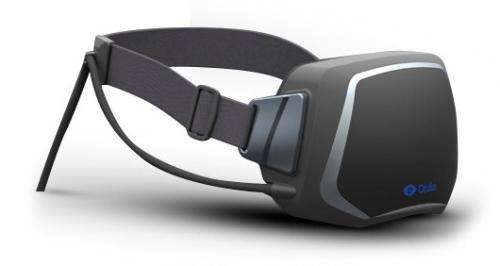April 6, 2016 report
The possibility of using virtual games reality to alleviate pain

(Medical Xpress)—A team of researchers with York St John University, in the U.K. has found positive results in testing a virtual reality (VR) gaming system as a possible non-pharmacological analgesic to aid in pain management. In their paper published in Royal Society Open Science, the researchers describe their study which consisted of experiments with local volunteers, their results, and why they believe such technology may one day become a part of pain management strategies.
Anyone who has played a video game for any length of time knows that they allow the mind to stray to another world, leaving behind thoughts of the here and now. Some may have even noticed that such a distraction can prove useful during times when there is pain, either physical or emotional. Medical scientists have heard about such instances and have begun to investigate the idea of using VR has an actual means of alleviating pain. In this new effort, the researchers enlisted the assistance of 32 adult volunteers from across the campus, asking them to participate in a pain management experiment.
The experiment consisted of having each participant dunk their non-dominant hand in a small tub of very cold water (1°C) while they played Radial-G (an interactive VR racing game) using their other hand and wearing an Oculus Rift DK2 Head Mounted Display and sound canceling headphones. Each volunteer was asked to complete four trials under four different conditions: no headset and no sound, sound only, headset only, and with both devices going. Tolerance for pain was measured as the amount of time the volunteer could keep their hand in the cold water before succumbing to the pain and pulling it out (each was asked to keep their hand in the water for as long as they could stand.)
In analyzing the results, the researchers found that the volunteers who had both the headset and sound going consistently managed to keep their hands in the cold water the longest. They also found that those who wore just the headset or headphones also lasted longer in the water than did those who did not have any VR experience to distract them. This, the team suggests, implies that VR gaming systems do appear to offer enough distraction to allow for a reduction in pain sensations. They acknowledge that their results are preliminary, and that the setting was quite different from that of patients experiencing pain from other sources, but believe further study is warranted.
More information: Sarah Johnson et al. Sound can enhance the analgesic effect of virtual reality, Royal Society Open Science (2016). DOI: 10.1098/rsos.150567
Abstract
Virtual reality (VR) technology may serve as an effective non-pharmacological analgesic to aid pain management. During VR distraction, the individual is immersed in a game presented through a head-mounted display (HMD). The technological level of the HMD can vary, as can the use of different input devices and the inclusion of sound. While more technologically advanced designs may lead to more effective pain management the specific roles of individual components within such systems are not yet fully understood. Here, the role of supplementary auditory information was explored owing to its particular ecological relevance. Healthy adult participants took part in a series of cold-pressor trials submerging their hand in cold water for as long as possible. Individual pain tolerances were measured according to the time (in seconds) before the participant withdrew their hand. The concurrent use of a VR game and the inclusion of sound was varied systematically within participants. In keeping with previous literature, the use of a VR game increased pain tolerance across conditions. Highest pain tolerance was recorded when participants were simultaneously exposed to both the VR game and supplementary sound. The simultaneous inclusion of sound may therefore play an important role when designing VR to manage pain.
© 2016 Medical Xpress



















